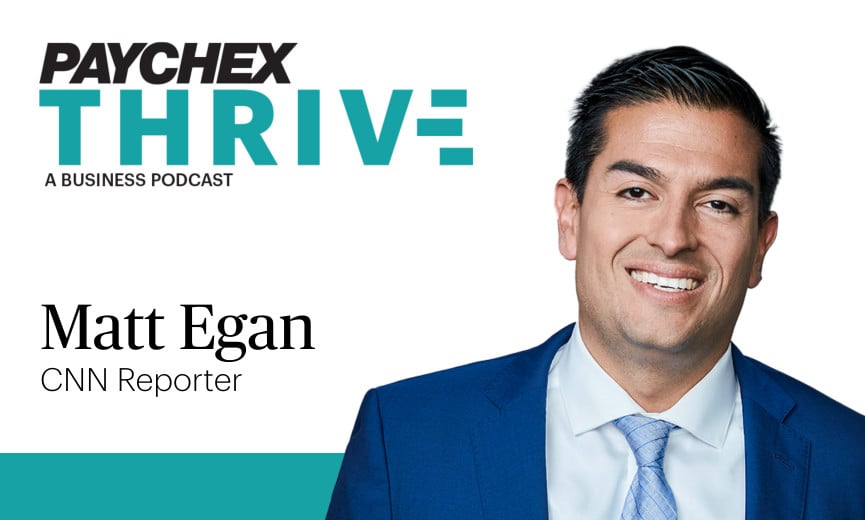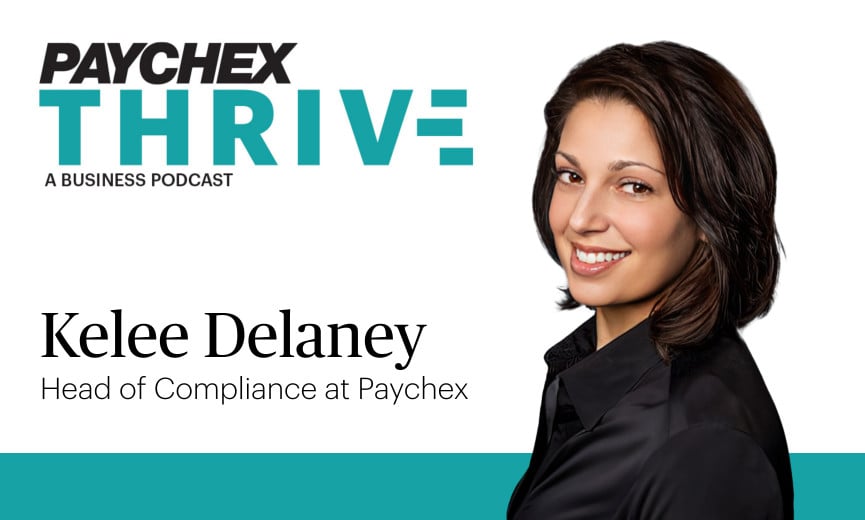Will Regulatory Agencies Be Unable to Regulate? Economy Looks Bright and Older Workers Excel

Podcast •

Summary
Businesses might soon get a break from some regulations if the Supreme Court rules later this year to limit regulatory agencies from expanding the rulings beyond what Congress intended. Gene Marks also points out that American Consumer Sentiment is on the rise, another boon for the economy and businesses. One more plus: 1 in 5 Americans older than 65 are still employed and their earning power is growing. Gene says businesses should tap into the experience and willingness to work, work longer hours, and be positive contributors. Listen to the Paychex THRIVE, a Business podcast.
View Transcript
[Gene Marks, host]
Hey, everybody, it's Gene Marks, and welcome to this week's episode of the Paychex THRIVE Week in Review. This is the podcast where every week we take a few items in the news that impacts your small business, and we talk a little bit about how it impacts your small business. And there are some items in the news this week that you really want to be paying attention to.
The first comes from a report on CBSNews.com, and it's about the Supreme Court. In the past week, the Supreme Court heard an argument that could have a huge, huge impact on your business. The Conservative majority appeared likely last Wednesday to curtail the ability of federal agencies to regulate a host of areas that touch on American life, including your business because there's been a challenge, a challenge to a 40-year-old decision that's been characterized as a bedrock of administrative law.
Now, let me see if I can explain this to you correctly. The specific court case comes from a herring fisherman, believe it or not, who has to apply to one of the government agencies that's overseeing their operations. The agency a number of years ago said that the fishermen had to put monitors on its boat to check about overfishing and making sure that they're in compliance with certain rules. And the herring fisherman was okay with that. But then the agency came back after that and said, well, we're going to put the monitor on your on your boat and you also have to pay for that monitor, as well.
When that happened, that sort of tipped the business owner or the fisherman over the edge and he sued. And that lawsuit is now heading to the Supreme Court. Why? Because right now, when Congress passes a law, they pass the law and hand over the implementation to whatever government agency that's supposed to oversee that law.
And Congress, the Supreme Court had ruled or there have been rulings in the past that said that the agencies have the discretion to implement that law. So, in the herring fisherman's example, you know, the agency said, hey, to implement this law, we're going to have to put a monitor on your boat and to implement this law, we're going to have to charge you for the monitor.
The herring fisherman said that's going way too far. That's going outside of the bounds of what Congress is allowed, and that's what the Supreme Court heard the argument for. When Congress passes a law and sends it to an agency, does that agency – the EPA, the IRS, the Department of Agriculture – do they then have the discretion to then expand those rulings any way that they want so that they have to discretion to do that under the law? Or if they do expand those rulings and people can test it, it can be contested and let a judge decide whether or not it's really in the letter of the law.
If the Supreme Court decides in favor of the herring fishermen – and this will happen in the summer – it basically means that all of these regulations that all these agencies are imposing on businesses around the country can be contested in the courts. That could have a huge change in where these regulations are issued and the way that they are enforced.
So, keep this in mind, everybody it is it is something that will happen in the summer, and it could have a big impact on your business, particularly if you are facing certain regulations depending on the industry that you're in.
The next bit of news, it comes about the Consumer Confidence index, and this comes from the Wall Street Journal. And here's the good news: Americans are suddenly a lot more upbeat about the economy. According to the University of Michigan's Consumer Sentiment index, sentiment surged 29% since November. It's the biggest two-month increase since 1991.
It's a sharp turn after persistently high inflation but lingering shock from the pandemic's destruction, fears and fears that there was a recession around the corner, but now North Americans are bucking up. As inflation calls and the Federal Reserve signals that interest rate increases are likely behind us and with the solid labor market putting money in the bank accounts of freely spending consumers, the Wall Street Journal says that recession fears are fading, according to this report.
The University of Michigan's Consumer Sentiment also said that sentiment leaped 13% in the first half of January from December. That's after that sharp rise the prior month. The pickup in sentiment was broad based, guys, spanning consumers of different ages, income, education and geography. Great news because I don't care what kind of business you're in. I don't care if you're selling to other business or directly to consumers. In the end, it is the consumer who buys these products, and the consumers have been holding up the American economy through 2023.
With sentiment now really turning positive like this, that's a good signal that they're going to continue to buy as we head into 2024.
Finally, the Pew Research Center issued a new report about older workers, and it's something that you should know about. Roughly 1 in 5 Americans age 65 and older were employed in 2023. That's nearly double the share of those who were working 35 years ago. Not only that, their earning power has grown in recent decades. In 2022, the typical worker age 65 or older earned $22 per hour; That's up from $13 an hour in 1987. Earnings from younger workers have not been keeping pace.
So, some of the facts that came out of this. Older workers are working more hours on average than in previous decades; 62% of older workers are working full time, compared to 47% in 1987. Older workers are more likely to have a four-year college degree than in the past. And also, older workers are more likely than in previous decades to be receiving employer-provided benefits, such as pension plans and health insurance.
So, what does this all mean? It means that older workers are a big part of the workforce. Those boomers that were going to retire, well, not as many are retiring as we thought. Now, there might be financial reasons why – maybe they don't have enough money in the bank to retire, and that’s I'm sure, part of the reason. But I think other reasons are that, listen, we're living longer and healthier and stronger and we want to keep active and out there and we don't want – our spouses are kicking us out of the house and telling us to get to work. So, we're doing that.
Other studies have shown that older workers are great workers, and a lot of employers in many cases prefer older workers because of their experience, you know, and they're bringing it to a job. So, older workers: big part of the workforce, continue to grow, earning more, working more hours, an absolute resource for business owners of all sizes.
My name is Gene Marks and you have been listening to the Paychex THRIVE Week in Review podcast. Hope you got some good information out of here and hopefully this will help you run your business. If you need any advice or tips or help and running your business, or if you'd like to suggest a guest for a future Paychex THRIVE podcast, please visit us at payx.me – P-A-Y-X dot M-E – forward slash thrivetopics.
Thanks for listening. I'll be back next week with a few more bits of news that impacts your business and some thoughts around navigating around that news.
This podcast is property of Paychex, Inc. 2024. All rights reserved.

 Apple Podcast
Apple Podcast Spotify
Spotify iHeartRadio
iHeartRadio






